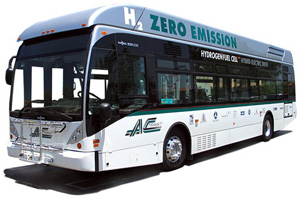Hydrogen Fuel Cell Vehicles
Hydrogen fuel cell vehicles use fuel cells to produce zero-emission transportation. A fuel cell is an electrochemical device that combines hydrogen fuel and oxygen from the air to produce electricity, heat and water. Fuel cells operate without combustion, so they are virtually pollution free. Since the fuel is converted directly to electricity, a fuel cell can operate at much higher efficiencies than internal combustion engines, extracting more electricity from the same amount of fuel. The fuel cell itself has no moving parts - making it a quiet and reliable source of power. [Source: UTC Fuel Cells].
In a hydrogen fuel cell vehicle, the electric power generated by the fuel cell is used to power an electric motor, which drives the vehicle’s wheels. The fuel cell is fueled by compressed hydrogen gas, usually stored in high-pressure tanks carried by the vehicle. To refuel, the vehicle must be driven to a specialized hydrogen refueling station, capable of dispensing high-pressure hydrogen into the vehicle’s tanks.
Major automakers such as GM and Toyota are investing heavily in fuel cell technology. While fuel cells are not likely to be cost-effective for the average car buyer for at least another five or ten years, fuel cells are being used today in an increasing number of fleet vehicles. The U.S. Government plans to invest hundreds of millions of dollars in fuel cell vehicle demonstration projects over the next few years – funds that are likely to be augmented by state and local investments as regions compete to attract these federal dollars. Fleet operators who want to be a part of the fuel cell revolution can tap into these sources of funding to offset the higher cost of acquiring and operating fuel cell vehicles.
 |
| Van Hool 40-foot bus equipped with ISE hybrid fuel cell drive system. |
TransPower offers expertise and access to the leading suppliers of hydrogen fuel cell transportation solutions. We believe there is particular promise in the emergence of the fuel cell hybrid technology pioneered by ISE Corporation, a charter member of TransPower’s Preferred Supplier Network. In a fuel cell hybrid drive system, batteries are used to augment the fuel cell. The availability of battery power to meet peak power requirements enables use of a smaller, less expensive fuel cell and further improves fuel efficiency, as demonstrated over the past few years by a variety of ISE fuel hybrid transit buses.
In addition to providing fuel cell-related expertise and products, TransPower can assist client-partners in selecting or designing the right electric drive system to take advantage of advances in fuel cell technology. In both fuel cell hybrid and "straight fuel cell" vehicles, electric motors, hydrogen storage, and vehicle and fuel cell control systems are vital to safe, reliable operation. TransPower"s Preferred Supplier Network includes supplier-partners that can deliver drive motors, controllers, and fuel cell-related products for vehicle applications.
TransPower is ready to help you decide if fuel cell technology can be used in your vehicle fleet, and can assist you in your search for government funding to help finance fuel cell vehicle acquisitions. TransPower’s personnel have participated in the planning of the U.S. National Fuel Cell Bus Technology Initiative, which has set aside nearly $50 million for fuel cell bus demonstration projects, and can help both client-partners and supplier-partners find other sources of funding for fuel cell-related research, development, and demonstration projects. |